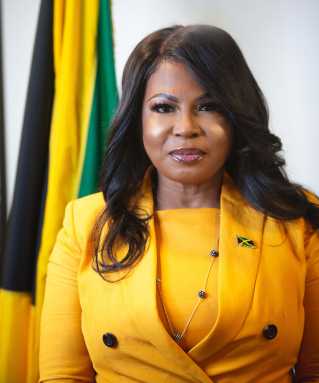Listeners:
Top listeners:
-
play_arrow
RadioJLR Just Press Play

In the wake of destruction caused by Hurricane Melissa in Jamaica, Caribbean immigration advocates in New York are urging United States President Donald J. Trump to protect Jamaicans in New York by granting them Temporary Protected Status (TPS).
The New York Immigration Coalition (NYIC), an umbrella policy and advocacy organization that represents over 200 immigrant and refugee rights groups throughout New York, noted on Wednesday that Hurricane Melissa caused catastrophic destruction in Jamaica, leaving residents across the island reeling from its impact.
“Everything from homes to local businesses has been destroyed, widespread power outages have occurred, and families are struggling to recover,” NYIC President and CEO Murad Awawdeh told Caribbean Life.
“Currently, Jamaica is not designated for TPS,” he added. “Given the scale of this natural disaster and humanitarian crisis that is unfolding, the Trump administration must act with urgency to grant TPS to Jamaica, ensuring that all 230,000 Jamaicans in New York state can stay without the fear of being deported as the island faces a long road to recovery.
“Hurricane Melissa’s aftermath reveals the devastating reality of natural disasters,” Awawdeh continued. “Across Jamaica, many are left with destroyed homes and businesses, and the painful task of rebuilding their lives. As the island faces a long road to recovery, the Trump administration must meet this moment and designate TPS for Jamaica.”
In New York, he said TPS has “enabled our immigrant neighbors to work legally, support their families, and contribute to the local economy.
“In contrast, deporting Jamaicans back to a country in the middle of a humanitarian crisis would be reckless and inhumane,” he said. “We urge the administration to immediately designate TPS for Jamaica, ensuring they have legal protections, stability, and dignity to continue to rebuild their lives without the fear of being ripped away from their loved ones.”
Meanwhile, as Hurricane Melissa moved north of Jamaica on Wednesday, the head of the United Nations team there stated that preliminary damage assessments from the Category 5 storm revealed a level of devastation “never seen before” on the Caribbean island.
UN Resident Coordinator Dennis Zulu emphasized the UN remains closely engaged with governments across the region, on-the-ground UN agencies, and the Caribbean Disaster Emergency Management Agency (CDEMA), noting the “tremendous and unprecedented destruction of infrastructure” across Jamaica, where Melissa made landfall on Tuesday.
Looking ahead to the months-long reconstruction and recovery effort, he told reporters in New York via video conference that it would require “a lot of resources” to rebuild and put the thriving economy back on its feet.
“I don’t think there’s any single soul on this island that was not affected by Hurricane Melissa”, Zulu said.
UN World Food Program (WFP) Director for the Caribbean Multi-Country Office, Brian Bogart, said: “This is a terrible tragedy, and there is a real sense of urgency here on the ground.
“What we’re really focused on now is trying to get food and logistics support to enable the entire humanitarian community to respond in coordination with the government”, he said, speaking from Kingston, the Jamaican capital.
Bogart said the agency’s primary focus is to deliver 2,000 emergency food boxes, which are ready to be airlifted from Barbados as soon as the airport reopens, providing enough support for approximately 6,000 people for a week.
As the leading logistical agency, the UN stated that WFP is also loading a vessel in Barbados from the Logistics Hub, which is run in conjunction with CDEMA, with essentials such as hygiene kits, shelter, generators, and other items from UN agencies and partners to support the humanitarian effort in Jamaica.
The UN noted that, early Wednesday morning, Hurricane Melissa crossed into Cuba, bringing 120 mph winds, heavy rain, and a warning of “life-threatening” storm surges. It’s due to move on to The Bahamas, followed by Bermuda.
The UN reported that the storm weakened to a Category 2, making landfall in Cuba. However, the National Hurricane Centre (NHC) there stated that Melissa would “remain a powerful hurricane when it moves across the Bahamas later today.”
UN Deputy Secretary-General Amina Mohammed said the slow-moving storm was “yet another demonstration of climate science and why we must fight for a world at 1.5 degrees Celsius.”
The UN said data from its aid coordination office, OCHA, shows Melissa ranks among the most intense storms to strike Cuba in recent decades, with maximum sustained winds near 138 mph (222 km/h) and two-day rainfall totals approaching 145 millimeters.
On Wednesday, the UN announced that it had allocated US$4 million each to Haiti and Cuba from its Central Emergency Fund to help communities prepare for the storm and mitigate its impact.
According to news reports, at least 20 Haitians – including 10 children – died due to river flooding as Melissa barreled across the region.
Conveying his heartfelt condolences to the families of those who have lost their lives, UN Secretary-General António Guterres reiterated his solidarity with the governments and communities affected by the hurricane.
“Guided by Resident Coordinators on the ground, the UN is working hand in hand with authorities and humanitarian partners to assess needs, assist those impacted, and prepare in areas that may yet face the storm’s impact,” he said.
UN General Assembly President Annalena Baerbock tweeted that, for small island developing States, “the climate crisis is a lived reality, and the cost of inaction is measured in lives and livelihoods.
“Adaptation isn’t optional, it’s survival,” she said. “Solidarity must become sustained, scaled-up climate action.”
Written by: Adm
© 2025. All Rights Reserved by Radio-JLR


